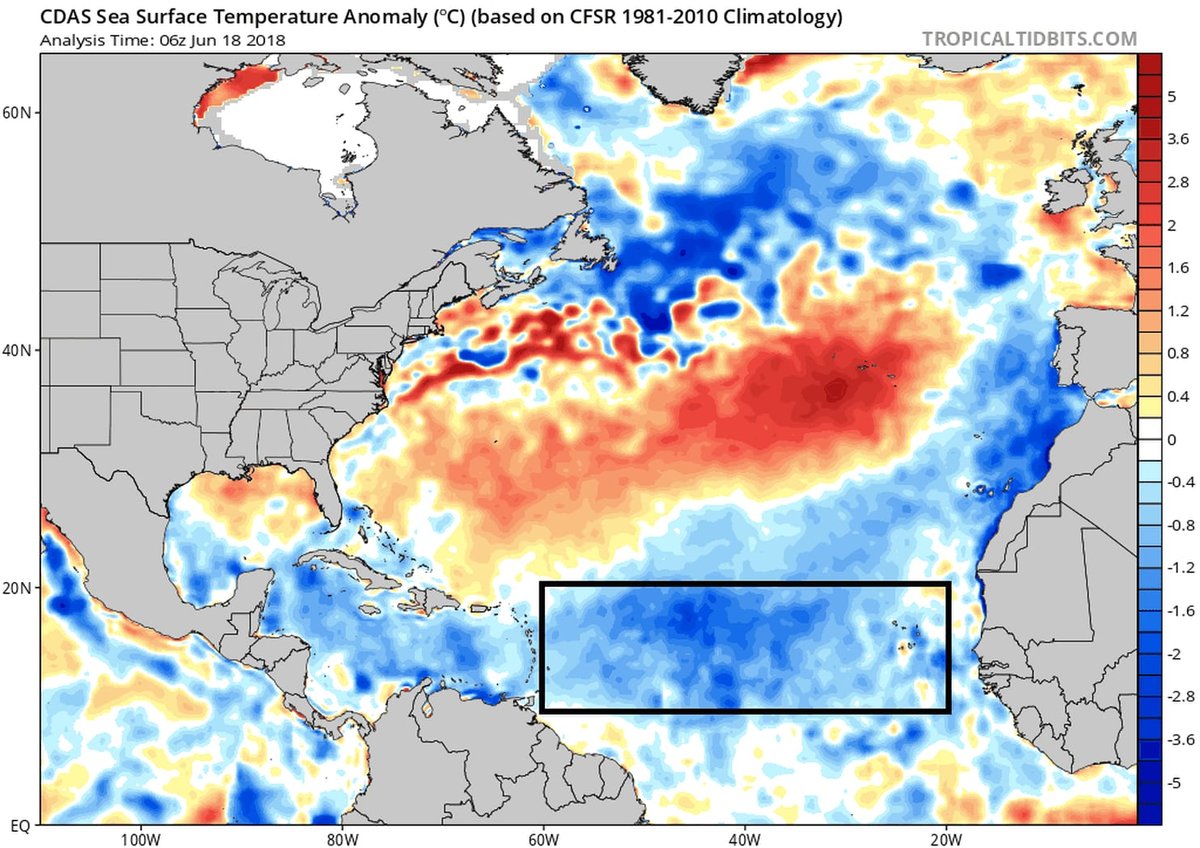“Prospects for a second straight busy hurricane season have diminished markedly,” according to Phil Klotzbach of the Colorado State University tropical forecasting team, as cooler Atlantic sea surface temperatures point to “profound impacts” for the 2018 hurricane season.
Warm water is the fuel source for tropical storms, Klotzbach explains, but the main tropical development region of the Atlantic ocean has cooled anomalously in recent weeks, leading the forecaster to suggest the chances of a benign season are rising.
In fact, sea surface temperatures across the main tropical storm development region of the Atlantic (as indicated by the black box in the image below) are now at the coldest level seen for the middle of June, since at least the early 1980s, Klotzbach explained in an article for the Washington Post.

Klotzbach explains that as well as being the fuel for tropical storms and hurricanes, warmer waters also help to create thunderstorm conditions, which he considers one of the building blocks of hurricanes.
The cooling has happened quickly, Klotzbach said, with the temperatures having been around normal as recently as March.
But from April onwards the weather pattern has been markedly different in 2018.
Klotzbach wrote, “Stronger-than-normal high pressure in the subtropical Atlantic has driven stronger trade winds that have intensified ocean mixing, evaporation and upwelling, and the tropical Atlantic has turned quite cold.
“The sea surface in the tropical Atlantic is the coldest on record (since 1982) and about 3 degrees (1.7 degrees Celsius) cooler than last year at this time. While 3 degrees may not seem like much, that’s a huge year-to-year difference for the tropical Atlantic historically.”
He notes that there is still time for the trend to reverse and temperatures to warm up somewhat, but says that time is now running out for this to happen and as a result it is beginning to look like cooler Atlantic temperatures will be a major factor for the 2018 hurricane season.
Recently, many of the most accepted forecasters of hurricanes have reduced their outlooks for the 2018 season, on the back of these cooler seas.
Also, reinsurance broker JLT Re had previously said that hurricane forecasts were likely to be reduced due to cooler sea-surface temperatures.
Klotzbach also noted another factor that could affect 2018 Atlantic hurricane activity, again pointing to the chances of a less impactful year ahead, as the probabilities of an El Nino forming in the Pacific during the peak of the hurricane season appear to have increased slightly, as he explained on Twitter.
Average of dynamical model guidance (red line) has slowly trended warmer over the past few months and is now calling for borderline weak #ElNino event by peak of Atlantic #hurricane season (August-October). pic.twitter.com/5A7ukhgRbB
— Philip Klotzbach (@philklotzbach) June 19, 2018
However, as we’ve highlighted before, it is not the number of tropical storms or even hurricanes that really matters, it is intensity of storms and where they are steered towards that drives the potential for insurance, reinsurance and ILS or catastrophe bond market losses.
Keep track of our 2018 Atlantic Hurricane Season page where we will update the forecast numbers over the coming months and stay tuned to Artemis for coverage of any hurricanes that form and pose a threat to reinsurance and ILS interests.
Register for our upcoming Singapore ILS conference before tickets run out!

 View all of our Artemis Live video interviews and subscribe to our podcast.
View all of our Artemis Live video interviews and subscribe to our podcast.
All of our Artemis Live insurance-linked securities (ILS), catastrophe bonds and reinsurance video content and video interviews can be accessed online.
Our Artemis Live podcast can be subscribed to using the typical podcast services providers, including Apple, Google, Spotify and more.































